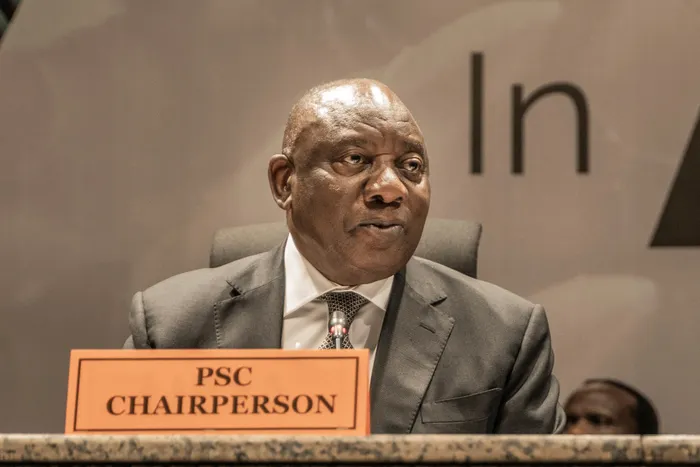AU Summit: Africa’s Free Trade agreement a long time coming

Picture: Amanuel Sileshi / AFP – South African President Cyril Ramaphosa speaks during a mini-summit on Peace and Security in eastern Democratic Republic of Congo (DRC) on the sidelines of the 36th Ordinary Session of the Assembly of the African Union (AU) in Addis Ababa on February 17, 2023. AU institutions such as the Peace and Security Council (PSC) and the African Peace and Security Architecture (APSA) need to be supported to effectively intervene in the Continent’s hotspots, the writer says.
By David Monyae
The African Union (AU) is holding its 36th Heads of State Summit this weekend February 18 and19 at its headquarters in Addis Ababa, Ethiopia. The Summit will be held under the AU Theme of the year 2023: “The Year of AfCFTA: Acceleration of the African Continental Free Trade Area Implementation”.
This theme is appropriate considering that it has been two years since the AfCFTA was launched and while progress has been made towards its implementation, it has not been fast enough.
The Summit will deliberate on the Protocol on Investment to the Agreement Establishing the African Continental Free Trade Area and the Protocol on Intellectual Property Rights to the Agreement establishing the African Continental Free Trade Area.
Agreement on the two protocols will pave the way for the complete implementation of the AfCFTA. The AfCFTA is billed to be the catalyst of the much-needed socio-economic transformation in Africa by lowering trade barriers, attracting foreign direct investment and increasing incomes.
This is even more important in light of the World Bank’s bleak forecast of the Continent’s economic performance in 2023. Africa’s economy is expected to grow by only 3.6 percent, down from 3.8 percent in 2022. This is similar to the African Development Bank’s report which predicts that the Continent’s growth rate will average around 4 percent between 2023 and 2024.
These levels of growth are not sufficient to eradicate poverty and place Africa on track to achieve the UN Sustainable Development Goals. Moreover, the Continent is already struggling with inflationary pressures induced by external economic shocks. At an average of 14.5 percent, inflation has eroded millions of people’s real incomes and rendered millions more unable to afford basic needs.
Hence, the Summit has its work cut out as leaders need to urgently find solutions to Africa’s economic malaise. Among other pertinent issues on the agenda of the Summit include peace and security in Africa, institutional reforms of the continental body, the Covid-19 pandemic, climate change and the global financial and energy policy.
Peace, as well as security, on the Continent is fragile and needs urgent attention. According to the 2022 Global Peace Index, five African countries namely the Central African Republic (CAR), the Democratic Republic of Congo (DRC), Somalia, South Sudan, and Sudan make the list of the ten least peaceful countries in the world. Burkina Faso, Nigeria, Niger, Somalia, and Mali are part of the ten countries most affected by terrorism. Mozambique and the DRC have to deal with rebellions in the northern and eastern regions of the two countries respectively that have claimed thousands of lives.
The conflict in the DRC has seen the country’s President Felix Tshikeledi engage in a war of words with his Rwandan counterpart, Paul Kagame, whom he accuses of supporting the rebels in the DRC. This has triggered concerns over a possible interstate war, which would further destabilise the Great Lakes region.
In recent years, Lesotho and Swaziland have also struggled with political instability, which remains to be addressed. Without peace and security Africa will not be able to achieve its economic goals. Ethiopia was also embroiled in a deadly conflict in the last two years, which has been halted by an uneasy ceasefire agreement between the Ethiopian government and the Tigray People’s Liberation Front (TPLF).
AU institutions such as the Peace and Security Council (PSC) and the African Peace and Security Architecture (APSA) need to be supported to effectively intervene in the Continent’s hotspots.
This is related to the issue of AU institutional reform, which is part of the agenda of the upcoming Summit. The institutional weaknesses of the AU, such as its lack of executive and legislative powers and its dependence on external sources of funds have for a long time limited the effectiveness of the continental body.
Despite its aspirations towards being a union, the AU is still very much an intergovernmental organisation that derives its power from the member-states. This makes it difficult for the organisation to act independently without the consensus of the member-states.
The Pan-African Parliament (PAP), one of the principal organs of the AU, still does not have legislative power. This has condemned it to being little more than a talk shop and a rubber stamp for the AU Assembly. Reforms are necessary to make the AU more effective in discharging its mandate and living up to the expectations of the African people.
It is also important that the Summit deliberate on the Continent’s approach to global issues such as the Russia-Ukraine war, climate change, and international trade, among others. The lack of unity among African countries on these issues has weakened Africa’s bargaining power, which it could use to determine the trajectory of global politics.
Also of interest is the Continent’s approach to external powers such as Russia, China, the US and the European Union (EU), which are increasingly showing interest in Africa. In the past these powers have interacted with Africa primarily on a bilateral basis. The Summit should push for a more multilateral approach to co-operating with external players. This will ensure that smaller countries are not taken advantage of and continental interests are advanced.
David Monyae is Associate Professor of International Relations and Political Science, and Director of the Centre for Africa-China Studies at the University of Johannesburg
This article is original to the The African. To republish, see terms and conditions.